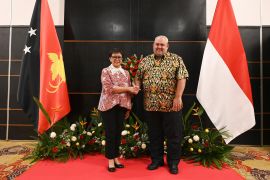Direct transactions using rupiah and yuan would protect both currencies from the negative impact of any change in demand for US dollar.Beijing (ANTARA News) - Indonesia and China would continue to push for direct transaction between the national currencies of the two nations to boost bilateral economic cooperation, an official said.
"Trade and economic cooperation between the two countries would expand. Therefore, it is better for us to have direct transactions in rupiah and yuan(Renmimbi/RMB)," Minister for State Enterprises Rini Sumarmo told Antara news agency here Wednesday night.
Rini was here to attend the signing of a loan agreement between three state lenders - Bank Mandiri,Bank Negara Indonesia (BNI) and Bank Rakyat Indonesia (BRI) with China Development Bank (CDB).
The minister said direct transactions using rupiah and yuan would protect both currencies from the negative impact of any change in demand for US dollar.
Increase in demand for dollar would put pressure on rupiah and yuan if the two countries would continue to use the US currency in bilateral transactions, she said.
Bank Mandiri, BNI and BRI received a total loan of US$3 billion from China Development Bank to finance infrastructure projects in Indonesia.
The agreement was signed by Bank Mandiri President Budi G. Sadikin, BRI president Asmawi Syam and BNI president Ahmad Baiquni and CDB president Zeng Zhijie with Rini and National Development and Reform Committee (NDRC) Xu Shaoshi.
The loan was the first part of a total loan of US$20 billion agreed between the Ministry of State Enterprises, CDB and NDRC, Rini said, adding there is also a loan of US$10 billion for PLN, the national power utility company.
The three state banks had a share of US$1 billion of the US$3 billion loan repayable in 10 years.
"Around 30 percent of the loan would be in Renminbi (RMB). This is the first phase. IKn the second phase the two countries agree to use direct transaction using rupiah and RMB," she said.
Budi Gunadi Sadikin said Bank Mandiri already proposed the use of RMB in banking transaction by its branch in Shanghai.
"Hopefully by the end of this year we could start using RMB, and no longer has to use dollar especially in banking deals in China," he said.
Achmad Baiquni said his bank already used RMB in banking transactions in a number of facilities for debtors.(*)
Editor: Heru Purwanto
Copyright © ANTARA 2015











